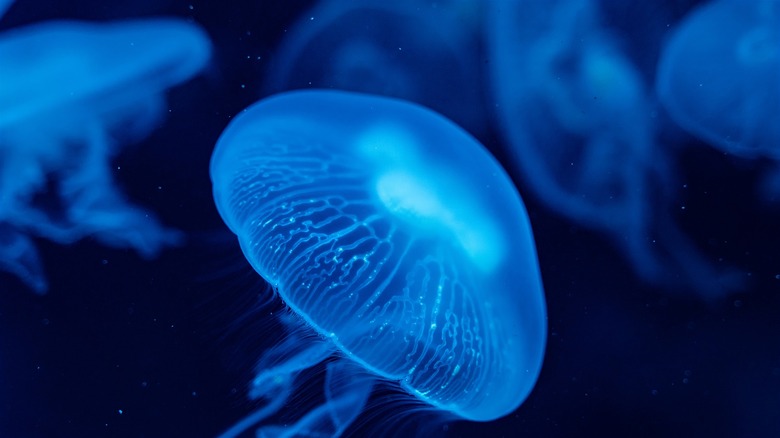The Best Safety Item To Pack For A Beach Trip Can Be Found In Most Pantries
What do you usually pack in your beach bag? A towel? Sunglasses? Sunscreen? Vinegar? ... wait, what? It may sound strange, but vinegar can actually be a really helpful item to have at the beach. This is because the pantry staple acts as a neutralizer against jellyfish stings. If you go swimming, sunbathing, or wading in an area that has jellyfish, you can get stung by their long, trailing tentacles.
Jellyfish have thousands of tiny, barbed stinging cells called nematocysts lurking in their tentacles. Each one contains a little nub of venom, and this is transferred to you if you brush up against their tentacles. (While we're on the subject of dangerous sea dwellers, read about the dangerous coral in the Caribbean that tourists often mistake for seaweed.)
Some Australian beaches have vinegar in first-aid stands to help with jellyfish stings. According to a medically reviewed article in Patient Info, this is what you should do if you're stung by a jellyfish: "Rinse thoroughly in seawater to wash off all the cysts you can. Do not use fresh water, as this may make any jellyfish parts remaining leak further venom. After rinsing thoroughly, soak or rinse the area in vinegar for about 30 seconds." And despite any urban legends, you shouldn't pee on a jellyfish sting as it can make the pain worse.
What happens if you're stung by a jellyfish?
Jellyfish stings can be very painful and cause burning, stinging, itchiness, welts, throbbing, and swelling. If the sting is severe, it could affect other areas of the body and cause symptoms like stomach pain, nausea, headache, muscle pain, faintness, dizziness, trouble breathing, and heart problems. How intense the reaction is depends on the type and size of the jellyfish, the size and age of the person affected, how long the person was stung for, and how much of the skin was touched. Children typically have worse reactions than adults.
Seek medical help if you start to experience more severe symptoms, or if it seems to be getting worse. There are different variations of sea jellies, including deadly box jellyfish, otherworldly moon jellyfish, red, orange, or brown sea nettles, and the sail-shaped collection of organisms known as Portuguese man o' war. The latter might make you think twice before swimming at Palm Beach.
Vinegar isn't always helpful, and may actually make stings from jellyfish common to certain regions, such as the UK and the Mediterranean, worse. It's not thought to be effective for certain types of jellyfish, such as the Portuguese Man o' War, because it may trigger the release of more venom. If possible, try to identify which jellyfish stung you and follow advice specific to that variation. To lower your risk of being stung, keep away from water where you can see a lot of jellyfish. Be wary of places where they are washed up on the beach and any areas known to have a lot of them. Don't touch any jellyfish whether they're alive or dead, and consider wearing protective clothing when diving.

